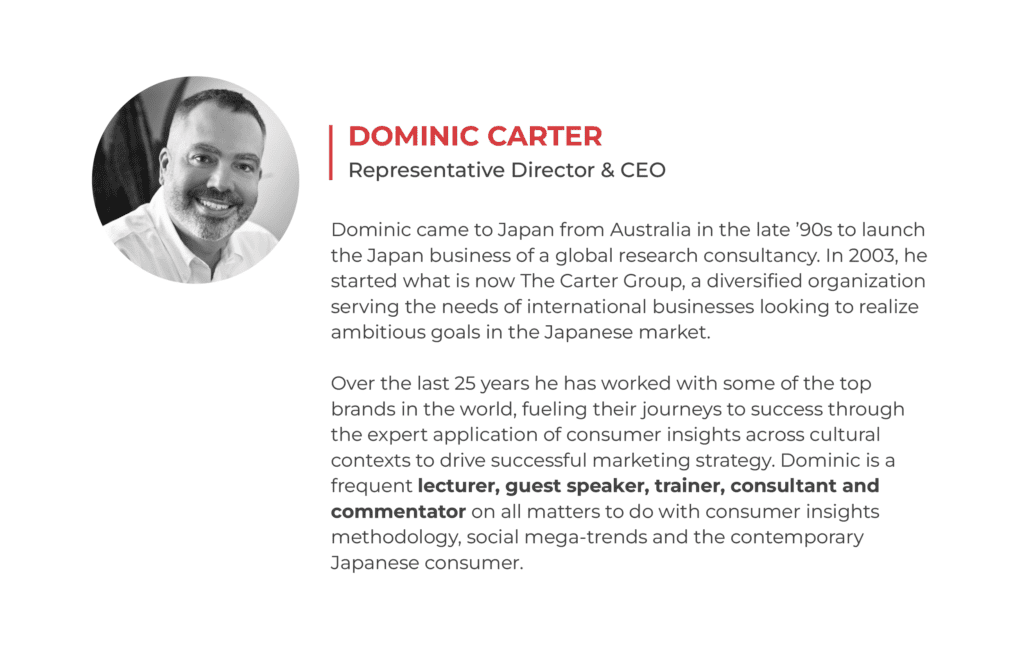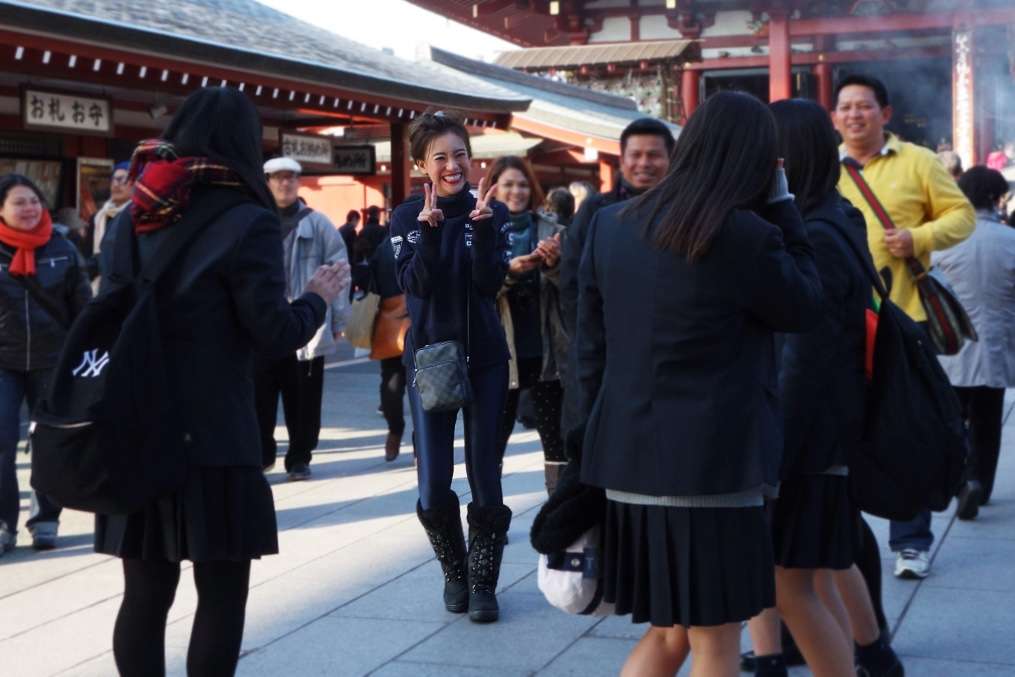Recently my colleague Debbie Howard and I were interviewed by Jamin Brazil for his Happy Market Research Podcast (a highly recommended podcast if you have an interest in market research). Among other things we discussed with Jamin how to avoid making mistakes when you’re doing international market research – or, put more proactively, how to get the most out of your project. I felt it was worth writing down and expanding on several of these insights.
Both Debbie and I have spent many years working with clients interested in cracking the Japan market. We’ve worked with people fulfilling a wide range of different client job functions including the owners of businesses, international business development teams, marketing teams, product teams, UX teams and, of course, market research teams. Our clients are invariably successful in their home markets, yet often start from a low base of experience in Asia, particularly Japan.
The knowledge gaps tend to relate to the unique characteristics of Japanese consumer behaviour, domestic marketing strategies, and differing styles of communication as well as some unique points in the way market research is typically carried out.
One thing is for sure – Addressing these knowledge gaps saves you both time and money in the long run. Some key tips for success are:
Speak with people who have worked in the market already
Spending some time to gain informal feedback on who’s going to be a genuinely good fit for you and your project is much better than just broadcasting a request for quotation. Different agencies have different methodological and sectoral experience sets. The ability to understand where you’re coming from and the way you need the work to be carried out varies from firm to firm. If you don’t have a network that extends internationally then try via some LinkedIn groups. Usually there will be somebody within one or two degrees of separation that will be able to give you some hard-won advice on who will be a great partner for you.
Methodology is the same, but different
All standard market research methodologies are utilized in Japan, but they’re sometimes used differently (or offer differing strengths and weaknesses) when placed in front of Japanese respondents. For example, while it is eminently possible to carry out market research interviews over the telephone, this has never been a highly used methodology in Japan. This is because in Japanese culture, due to the formality required in a phone call, it can be quite difficult for the interviewer to build rapport. Further, respondents’ willingness to share information over the phone with someone they haven’t met is generally less than in other markets.
On the heels of the Covid-19 crisis, the advent of the online Zoom interview is providing a nice compromise since it offers the rapport building potential of face-to-face interviews with the efficiency of a phone call. We welcome this development wholeheartedly, while acknowledging that for some types of interviews it may be challenging to get fantastic and deep insights unless it’s face-to-face.
Ask lots of questions before deciding your approach
Generally speaking, it pays to ask your on-the-ground market research partner detailed questions about methodology. Usually, it’s the best idea to follow their advice on things like recruitment, interview length, incentives and the like. But by all means, challenge the areas where you feel strongly that justification may be lacking for doing things a different way than in other markets. Some of the ways of doing research in Japan are more justified by the supplier’s comfort zone and habit as opposed to a fundamental objection on the part of the respondent. For years I was told that foreign researchers – let alone clients – should not enter Japanese houses to carry out interviews because they would make the respondents uncomfortable and bias the interview. However, with sensitive and polite behaviour this simply isn’t the case.
Having said that, making things comfortable and easy for the respondent, especially when it comes to using digital interviewing tools, is essential. While Japan is a highly advanced market, the average person (and remember, that average person is possibly much older in Japan than your country) may not have the same facility with devices and platforms. For that reason, since the Covid crisis started we’ve been sending out devices pre-loaded with the interviewing software so the respondent can just take it out of the box and use it.
It’s also important to bear in mind: just because a task seems straightforward (to you) doesn’t mean the respondent sees it as being their role to co-operate. For example, asking busy professionals like doctors to download new interviewing platforms is a non-starter. The old adage in Japan that “the customer is God” does sometimes work its way into the world of market research (with the respondent being God). Your recruitment and interviewing process always needs to make the Japanese respondent feel they are respected and valued, or you may well find problems with co-operation or messy complaints after the fact.
Partner with a local when it comes to analysing your results
Japanese operate within what anthropologists have called a high context culture. This means much communication is non-verbal or in fact communicated in what people don’t say. That can be really hard foroutsiders to interpret, including myself! I’ve lived and worked with Japanese people for over 25 years and it’s still hard for me to interpret what people really mean to communicate (or hide) when they speak. It helps tostrike up a good relationship with people working on your project who are natives and can help you interpret what you’re seeing and hearing. You might be witnessing the same thing but arriving at quite differentconclusions. The more open you are to having dialogue, even with the youngest people on the project, the better placed you are to interpret your observations with a sense of balance and perspective. It’s not necessary to form a consensus view on the findings and implications of your research with local observers, however it’s far from uncommon that the Japanese people within your team will arrive at similar conclusions to the locals on our team. So at least you’ll know where the discussions may lead.
Spend some time walking around
Covid-19 notwithstanding, if you do get the opportunity to spend time on the ground in Japan it’s a great idea to schedule time to walk around and take in the sights and sounds. Myriad questions will often arise from this. Several years ago we took the executive board of a large company from the United States on a market safari. We had expected to be dealing with complete neophytes but that client had actually already spent some time just walking around in advance. This added to their ability to empathize and greatly enhanced the quality of their observations and questions once they were properly guided. I’m a great believer in learning from the unscripted and unexpected!
Don’t rush into quantitative research
It’s rare that I don’t counsel caution when clients ask us to carry out a survey to appraise their market potential in Japan, when they have not already carried out exploratory, qualitative research. Auditing current awareness and behaviours with surveys is fine, but it is often the case that underlying consumer needs are quite different to your home country – and it takes time to learn about that. I will always remember the looks of disbelief on the faces of a visiting executive team from a major cleaning company when we reported to them that their product might be too effective. But spending time in home ethnographies with Japanese housewives had really given us an empathy for the emotions that drive extended rituals and processes around cleaning, not to mention the perceived dangers of strong cleaning products.
Failing to understand the consumer context can lead you to the conclusion that your product is not going to work in Japan. But this could simply be a case of not knowing what questions to ask, how to ask those questions, and how to talk about your own concept in a way the Japanese consumer easily understands. Knowing what to emphasise and what to downplay can make all the difference in coming up with a concept that will bring home the bacon when it comes time to do your testing. A survey may be flawless in its design and fieldwork, but if the thinking around the sample and the questions does not reflect a proper understanding of the local consumer’s agenda, the results may be incomplete or misleading.
At the end of the day, it’s a question of speaking to as many different colleagues and potential partners as you can about design and methodology. Then once you’re doing the project, engaging your local team to help you with context and interpretation is key. You may know your stuff back-to-front in your home market, but actively listening and keeping an open mind to disparate views will help you create a smooth and rewarding experience. Armed with these perspectives you should have every reason to be confident in your judgement about how to make your market research in Japan a success.

